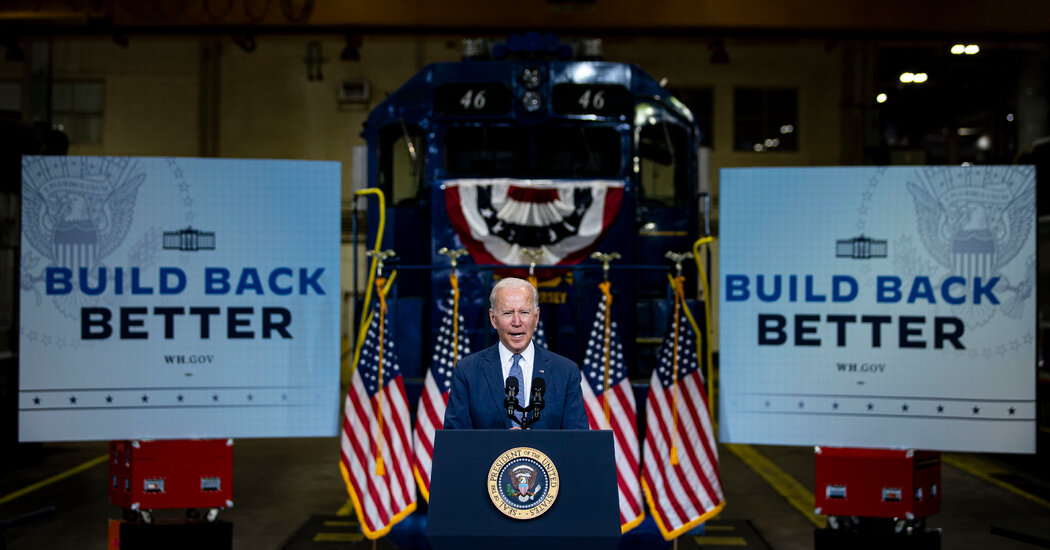
Sign up here to get On Politics in your inbox on Tuesdays and Thursdays.
During his campaign, Joe Biden made no secret of the presidential legacies he aspired to, frequently invoking Franklin D. Roosevelt and Lyndon B. Johnson. The two Democratic presidents both passed sweeping legislation that transformed the country, and Mr. Biden didn’t hide his plans to do the same. Now, 10 months into his presidency, his initial proposals have been chipped away by members of his own party, and critics say what’s left is less like the New Deal and more like a shell of itself.
But it bears remembering that Congress could still approve trillions of dollars in additional spending — and if it does, Mr. Biden would become the overseer of one of the biggest federal spending plans in modern history. Already, the president has enacted a $1.9 trillion pandemic relief package, known as the American Rescue Plan, which includes a wide range of health programs and anti-child-poverty plans that outstrip anything signed into law in the past 50 years.
“The comparison is by definition unfair, but he asked for it,” said Jonathan Alter, the author of the book “The Defining Moment: FDR’s Hundred Days and the Triumph of Hope.” “People are comparing the entire New Deal to what Biden is doing right now. He has a long way to go before he reaches that, but if you’re making the comparison between 1933 and 2021, Biden stacks up really well. For Biden to really have a Rooseveltian presidency, he would have to take his considerable achievements for this year and keep it up.”
This spring, Mr. Alter wrote an opinion essay in The New York Times arguing that Mr. Biden was starting his presidency by showing that the “long-distrusted federal government can deliver rapid, tangible achievements,” just as Roosevelt had.
We wanted to take his temperature on whether the president was still on that path. Mr. Alter was cautiously optimistic.
He pointed out that Mr. Biden was still on track to spend at least 10 times as much as Roosevelt, after adjusting for inflation.
“For it to compare to the New Deal, he would have to keep it up for another six years,” he said.
Where Mr. Biden may be falling short compared with Roosevelt is marketing his plans to the public. Famously, and much to the chagrin of his successors, Roosevelt coined the phrase “first 100 days” and urged the public to watch his immediate time in office. While Mr. Biden has embraced the phrase Build Back Better for more than a year now, his plans have taken on other terms, including the American Rescue Plan and the bipartisan infrastructure bill. Washington insiders may be comfortable using those terms, but they have hardly seeped down into the popular consciousness.
“Roosevelt knew how to sell,” Mr. Alter said. “When you look back at the coverage, there was constant reference to the New Deal program. He was more successful in getting everybody to call it the same thing.”
“If Biden was following more closely in Roosevelt’s footprints, his entire thing would be called Build Back Better,” he added. “They didn’t call it message discipline in the 1930s, but Roosevelt certainly had it.”
For as much as supporters and critics alike have focused on spending, Mr. Biden has compared himself to Roosevelt, who took office as Hitler rose to power, in another way. When Roosevelt entered the White House, “he was focused on the ‘fragility of democracy,’” Mr. Alter said. “I think Biden feels that way now, and that might be shaping some of his thinking in terms of reforming the filibuster.”
“The word dictator had a positive connotation in 1933,” Mr. Alter said. “And we’re kind of back in that soup.”
nine days of ideas to remake our future
As world leaders gather in Glasgow for consequential climate change negotiations, join us at The New York Times Climate Hub to explore answers to one of the most urgent questions of our time: How do we adapt and thrive on a changing planet? Glasgow, Scotland, Nov. 3-11; in person and online. Get tickets at nytclimatehub.com.
On Politics is also available as a newsletter. Sign up here to get it delivered to your inbox.
Is there anything you think we’re missing? Anything you want to see more of? We’d love to hear from you. Email us at [email protected].



